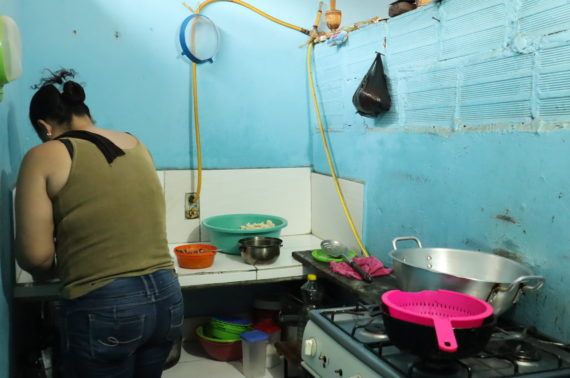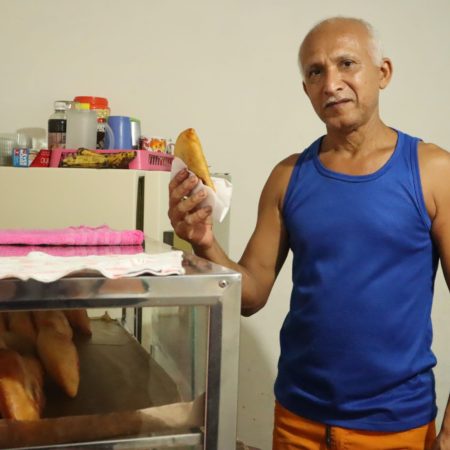 Stories
Stories
November 9, 2021 • 3 min read
Pedro Damián Ruiz Rosales, 55, migrated from Venezuela to Colombia six years ago. He currently lives in the city of Bucaramanga with his wife and five children.
“I came to Colombia,” says Pedro, “because of the deteriorating situation in Venezuela. I was unemployed, as there were no more job opportunities in the transportation sector, where I worked. If I worked one day, I had to go 15 days without working. I used to transport medicine and food. The economic situation was getting much worse, and in 2015, many people were leaving for Colombia.”
A Difficult Decision
Eventually, even though he could not get official travel documents, Pedro had to leave Venezuela . He left on a bus bound for Colombia; five months passed and his wife and another son made it to Colombia. His other older children had already crossed the border before him.
“Not all my compatriots were able to make it, because of the situation and the costs. I didn’t want to leave my country, of course, but I felt I had to,” added Pedro.
Like most migrants and their families, Pedro faced huge challenges when he arrived in Colombia. He struggled to find employment, secure social protection and basic services. “To earn income, our five children (ages 19 to 35) and I worked at whatever job we could find. In Colombia we are all limited in the jobs we can get, because we have no official papers. I currently work in a warehouse where I load vegetables onto trucks every day.”

Pedro’s wife working in the family’s home empanada business
Barrio Resiliente – Resilient Neighbourhoods
Colombia has suffered several humanitarian crises in recent years, due to internal armed conflict, migration, the Covid-19 pandemic and natural disasters such as floods and landslides. GOAL has been there, however, providing life-saving and life-changing aid.
Through GOAL’s Barrio Resiliente (Resilient Neighbourhoods) project, Pedro has received business development training. Pedro and his wife were also given material support to establish a home-based business. Today, they cook and sell empanadas (a typical product of the region, based on flour, meat and rice). This provides the family with a sustainable additional income.
An Opportunity to Grow
“We sell delicious empanadas. My wife prepares them and I do the promotion. We were given the opportunity to have different source of income from our daily work. It is our first real opportunity to save and grow,” says Pedro.
Although he thought he would only spend five months outside Venezuela, Pedro has been in Colombia for more than six years now. “Although the first years were very difficult, we now have more stability than before. This is in part thanks to GOAL’s support. After a very challenging time, things are starting to get better for us, and we hope our business can grow.”

Pedro Damián at his home empanada business
The Venezuelan Migrant Crisis
According to the UN over 5.6 million Venezuelans have fled the country in the past five years. Between 2015 and January 2021, the Venezuelan migrant and refugee population in Colombia rose from 39,000 to 1.72 million.
Although more than 720,000 Venezuelans recently had their status legalised in Colombia, over one million remain undocumented. With so many migrants in legal limbo, they are unable to find work and so rely on the informal economy. As a result, many end up living in precarious conditions, often sleeping on the streets with little or no access to basic services. GOAL teams are continuing to work on the ground in Colombia to support these communities.
GOAL’s Urban Neighbourhood Approach in Colombia
This year GOAL introduced its Barrio Resiliente “Building Resilient Cities through Resilient Neighbourhoods” programme in Colombia. The initiative is supporting communities to reduce risks from urban disaster. It aims to increase the resilience of vulnerable refugees, returnees, and host communities through the urban neighbourhood approach and economic recovery activities.
GOAL is implementing Barrio Resiliente with the support of USAID and strategic partner, Tierra de Hombres. The project is targeting more than six thousand inhabitants and 130 businesses in neighbourhoods in the Atlántico, La Guajira, Santander, and Norte de Santander departments. Fondazione Terre des Hommes is supporting the project in Norte de Santander Department.
Donate now to help us support people like Pedro.
